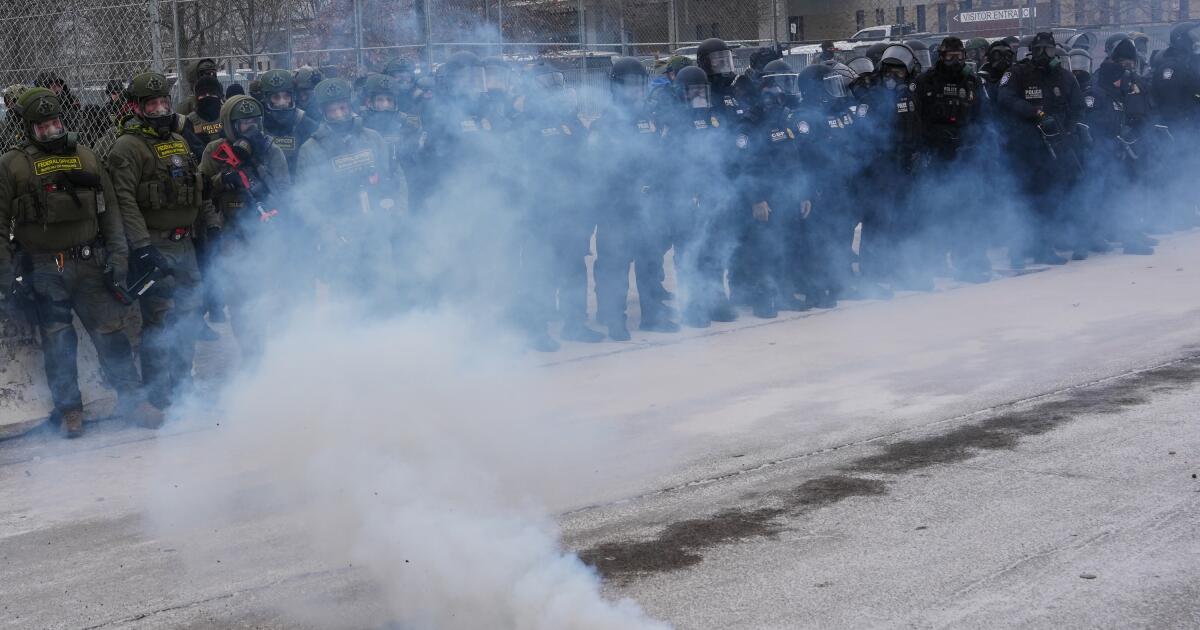Judge rules ICE in Minneapolis can’t detain, tear-gas peaceful protesters
MINNEAPOLIS — Federal officers in the Minneapolis area participating in the largest recent U.S. immigration enforcement operation can’t detain or tear-gas peaceful protesters who aren’t obstructing authorities, including when these people are observing the agents, a judge in Minnesota ruled Friday.
U.S. District Judge Kate Menendez’s ruling addresses a case filed in December on behalf of six Minnesota activists. They are among the thousands who have been observing the activities of Immigration and Customs Enforcement and Border Patrol officers enforcing the Trump administration’s immigration crackdown in the Minneapolis-St. Paul area since last month.
Federal agents and demonstrators repeatedly have clashed since the crackdown began. The confrontations escalated after an immigration agent fatally shot Renee Nicole Good in the head on Jan. 7 as she drove away, a killing captured on video. Agents have arrested or briefly detained many people in the Twin Cities crackdown.
The activists in the case are represented by the American Civil Liberties Union of Minnesota, which says government officers are violating the constitutional rights of Twin Cities residents.
After the ruling, Department of Homeland Security Assistant Secretary Tricia McLaughlin issued a statement saying her agency was taking “appropriate and constitutional measures to uphold the rule of law and protect our officers and the public from dangerous rioters.”
She said people assaulted officers, vandalized their vehicles and federal property, and attempted to impede officers from doing their work.
“We remind the public that rioting is dangerous — obstructing law enforcement is a federal crime and assaulting law enforcement is a felony,” McLaughlin said.
The ACLU didn’t immediately respond to requests for comment Friday night.
The ruling prohibits the officers from detaining drivers and passengers in vehicles when there is no reasonable suspicion they are obstructing or interfering with the officers. Safely following agents “at an appropriate distance does not, by itself, create reasonable suspicion to justify a vehicle stop,” the ruling said.
Menendez said the agents would not be allowed to arrest people without probable cause or reasonable suspicion the person has committed a crime or was obstructing or interfering with the activities of officers.
Menendez also is presiding over a lawsuit filed Monday by the state of Minnesota and the cities of Minneapolis and St. Paul seeking to suspend the federal enforcement crackdown, and some of the legal issues are similar. She declined at a hearing Wednesday to grant the state’s request for an immediate temporary restraining order in that case.
“What we need most of all right now is a pause. The temperature needs to be lowered,” state Assistant Atty. Gen. Brian Carter told her.
Menendez said the issues raised by the state and cities in that case are “enormously important.” But she said it raises high-level constitutional and other legal issues, and for some of those issues there are few on-point precedents. So she ordered both sides to file more briefs next week.
McAvoy and Karnowski write for the Associated Press and reported from Honolulu and Minneapolis, respectively. AP writer Hallie Golden in Seattle contributed to this report.
